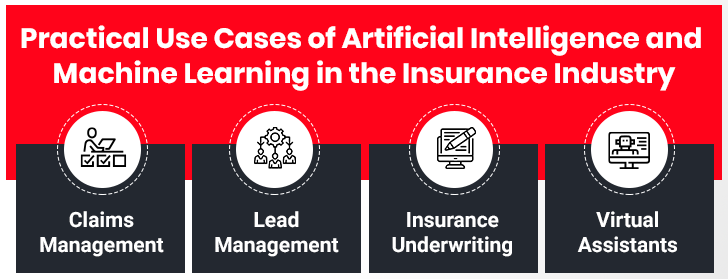In my previous post, we gained insights into how Insurtech Companies are boosting the Growth Trajectory for Insurers in the evolving business landscape. In this blog, we will delve into the foundational elements of the new-age technologies such as Artificial Intelligence and Machine Learning in the Insurance Industry for powering software solutions and disrupting the insurers’ ecosystem.
As the insurance industry welcomes digitalization with a red carpet for innovation and efficiency, Artificial Intelligence and Machine Learning occupy a mission critical role in inviting success in the disruption through technology. This is the reason insurers have increasingly started to rely upon the essence of AI-ML. According to a recent study, more than 80% of insurers emphasized that AI was already a part of their business model or would be within the next three years.

Damco’s 2020 Technology Leadership Study, states that 21% of CTOs chose Artificial Intelligence (AI) and Machine Learning (ML) as their business priority for 2020. Another study conducted by McKinsey reported that by 2030, Artificial Intelligence will take over all aspects of the insurance industry. Such figures highlight how insurers have struck gold while discovering the close working relationship between Artificial Intelligence/Machine Learning & Insurance.
As AI and ML in insurance continue to boom in demand by all the competing insurers, let us explore the use-cases that act as proof for AI-ML to be a substantial base of technology growth in the insurance landscape.
Top AI ML Use Cases in Insurance

Claims Management
Settlement of claims is a process requiring utmost precision given the background of the increasing number of fraudulent cases leading to a rapid increase in the losses of the industry every day. Given that such losses amounting from fraud cost the sector a whopping $40B per year, it is high time for a technological intervention to improve on this front.
The assistance offered by AI makes the process smooth by generating structured sets to organize claims data and process them faster. Further, the process is executed in a completely automated and unbiased manner, which mitigates the possibility of internal or external fraud.
Resultantly, insurance software reduces the scope of any costly errors by automating fraud detection audits and by providing innovative solutions like speech-based claims processing. These are specialized claims converted to written text with the help of AI, making documentation and claims management easier and more efficient. At the same time, the speech inputs can also function as voice-based biometrics to authenticate the claim.
Lead Management
Artificial Intelligence is a reliable solution for prospect data analysis as it automates data extraction from PDF reports and compares against various policy combinations for better marketing mechanisms. Apart from fetching data, such as search history, cookies tracking, social media profile, etc., AI/ML systems can effectively engage with prospects through meaningful conversations and qualify leads in the process.
The insurance agency software also drives personalized marketing which is possible by AI-driven inputs generated during the lead management process. One can rely on its automated product recommendations and natural language question-answering with the potential to screen in high-quality leads and convert them into long-term customers. Similarly, AI helps the insurers navigate through recommendations according to an analysis of prospects’ purchase history, potential spending, thereby improving the chances of cross-selling and up-selling.
Insurance Underwriting
There is no second-guessing to the statement that the future of underwriting will be dominated by automated AI-ML new-age technologies as they have already begun to enhance the quality of risk evaluation. Risk evaluation systems powered by AI-ML can conduct a comprehensive risk assessment by leveraging the likes of predictive modeling to factor in future eventualities.
Automated demand forecasting presents a win-win for insurance organizations with AI extracting meaningful insights from multiple data sources and guiding the insurer to make decisions. Insurers can balance their human resource management as this heavy task of underwriting would be checked off the list from the insurer’s table easily with the help of AI-powered insurance software.
Such solutions can help streamline one-on-one customer interactions, by matching potential buyers with suitable and capable agents depending on customer requirements to increase the chances of conversion. As such, even in pockets where manual processing is a requirement, software solutions can enrich them and make them more efficient.
Virtual Assistants
With most of the customers being digitally evolved, virtual assistants are becoming the new quality resource for insurers to take up customer queries.
The ability to foster deeper customer relationships through AI-powered Natural Language Processing is equipping chatbots to enhance customer experience. These chatbots leverage user data and contextual data from multiple sources to timely resolve customers’ queries and help in maintaining a consistent brand experience through every customer interaction.
Additionally, by acting as a self-service portal that is always available to address customer queries, insurers are effectively empowering the end-user to gain control over the products that they choose and commit to them in the long run. These virtual assistants can extend a bouquet of services, from policy renewal to upgrades to accepting claims and beyond, which will cater to the customer’s diverse requirements and empower them in making their own decisions.
Conclusion
The path to digitalization is an evergreen value proposition in the current scenario of remote working and the touch of AI-ML makes the insurance software sparkle in the crowd of competing insurers hungry for recovery and balancing of heavy claims management.
The gaps in the path of evolving insurtech according to the recent trends of insurtech can be streamlined by AI-based innovation in the ecosystem. This might just be a beginning in the growth of insurance technology of AI-ML new-gen tech and there is still much left to be explored further. Most importantly, it grants resilience to businesses to adapt to the changing trends, whatever they may be.
AI and ML are boosting Insurance software solutions to cater to different insurance processes. Policy Management is another important insurance process that is being evolved with technological upheaval. AI and ML, paired with automation technologies can bring efficiency in the policy management process for insurers.





